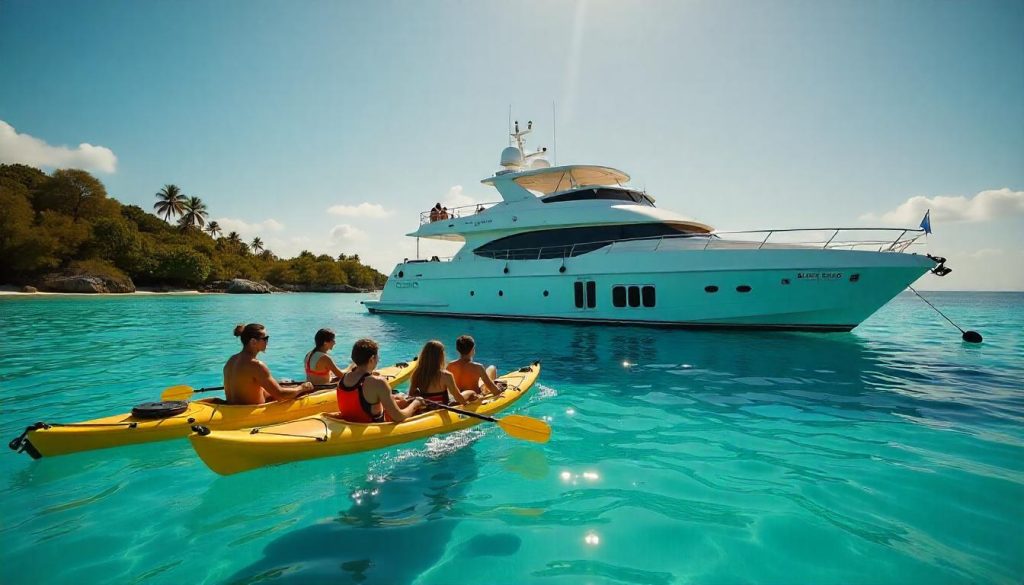2025年、環境に優しいヨットのチャーターが、旅行者が持続可能な方法で海を楽しむことを求めるようになり、人気を集めている。ヨットのチャーターは豪華さと冒険を提供しますが、燃料の使用、廃棄物、海洋の混乱を通して環境に影響を与える可能性もあります。ヨットの経験があるあなたなら、思い出に残る旅を楽しみながら、フットプリントを最小限に抑えるための実践的なヒントをきっと気に入っていただけるはずです。環境に優しいヨットの選び方、エネルギー消費の削減、廃棄物の管理など、チャーターを楽しみながら環境に配慮したものにするための戦略をご紹介します。
持続可能なヨットを選ぶ
持続可能性を念頭に置いて設計されたヨットを選ぶことから始めましょう。最近のヨットの多くは、ハイブリッドエンジンやソーラーパネルなど、環境に優しい機能を取り入れています。例えば、サイレント60ヨットは推進力にソーラーパワーを使用し、排出ガスを大幅に削減しています。LED照明やボトル入りの水の必要性を減らすウォーターメーカーなど、エネルギー効率の高いシステムを備えた船舶を探しましょう。また、環境基準を保証するブルーフラッグ(Blue Flag)のような団体の認定を受けたヨットを選ぶのもよい。環境に優しいヨットを選ぶことは、環境に優しいヨットチャーターの第一歩です。
小型で効率的なボートを優先
一般的に、小型ヨットは大型ヨットよりも燃料消費量が少ない。例えば40フィートの双胴船は、100フィートのスーパーヨットよりも少ないエネルギー消費で、しかも少人数のグループには十分なスペースを提供する。また、双胴船は安定性が高いため、バランスを保つためにエンジンを過度に使用する必要が少なくなります。地中海でチャーターする場合、小型のボートは岸に近いところを航行できるため、テンダートリップの燃料を最小限に抑えることができます。大きさよりも効率を優先することで、海を楽しみながら環境への影響を減らすことができます。
エネルギー消費の削減
ヨットは照明、電化製品、航行のためにエネルギーに大きく依存していますが、使用量を削減するための対策を講じることができます。使わないときは照明や電子機器の電源を切り、可能な限りエアコンの代わりに自然換気を利用する。例えば、カリブ海でチャーターしている間は、エアコンを稼働させるのではなく、ハッチを開けて風を取り入れる。ヨットにソーラーパネルがある場合は、発電機の燃料を節約するため、日中はソーラー発電装置を使用する。エネルギー消費の削減は、環境に優しいヨットのチャーターの重要な側面であり、フットプリントを軽くすることを保証します。
燃費効率を高める旅程の最適化
燃料の使用を最小限に抑えるルートを計画する。周遊ルートを選んだり、出発地の近くに滞在したりして、長距離を避ける。例えば、ギリシャの島々では、クレタ島に向かうのではなく、サントリーニ島やナクソス島など、近くの島々の間を航行する。また、安定した適度なスピードで航行すること。スピードが速いと燃料を多く消費する。条件が許せば、ヨットやカタマランではエンジンの代わりに帆を使う。低燃費の旅程はエネルギーの節約になるだけでなく、環境への影響を抑えながら、より多くの時間を水上で楽しむことができます。
責任ある廃棄物管理
持続可能なボート遊びのためには、ゴミの管理が重要です。水筒、ストロー、容器など再利用可能なものを持参し、使い捨てプラスチックを避けましょう。例えば、デッキで飲み物を飲むときは、プラスチック製のカップの代わりに、生分解性または再利用可能なものを使いましょう。リサイクル可能なもの、堆肥化可能なもの、ゴミを適切に分別し、リサイクル施設のある港に着くまで保管しましょう。例えば、セーシェルの多くのマリーナには廃棄物処理場があります。責任を持って廃棄物を管理することで、チャーター中の海洋生態系を守ることができます。
食品廃棄の最小化
食品廃棄は環境破壊につながるので、食事は慎重に計画する。買いすぎを避け、グループの必要量に基づいた備品リストを作成する。例えば、バハマで1週間チャーターする場合は、グループの人数に合わせて食事を計算し、その計画に従いましょう。昨晩の焼き魚をランチのサラダに変えるなど、残り物をクリエイティブに使う。また、輸送にかかる二酸化炭素排出量を減らすため、地元の旬の食材を選びましょう。食品廃棄物を最小限に抑えることは、環境に優しいヨットのチャーターの原則をサポートし、持続可能な旅を維持します。

海洋生態系の保護
ヨットは海洋生物の生態系を乱す可能性があるが、被害を最小限に抑えるための対策を講じることができる。グレート・バリア・リーフなどでは一般的な係留ブイを利用しましょう。また、イルカやカメなどの海洋動物にストレスを与えないよう、安全な距離を保ちましょう。例えば、フランス領ポリネシアでは、ザトウクジラは最低100メートル離れて観察するようガイドラインに従ってください。化学物質がサンゴに害を与えないよう、サンゴ礁に安全な日焼け止めを使いましょう。海洋生態系を保護することで、将来のチャーターのために海が活気を保つことができます。
廃棄物を海に流さない
汚水や雑排水を含む廃棄物は絶対に海に流さないでください。最近のヨットにはホールディングタンクがありますが、それを使用し、港の指定されたポンプアウトステーションで空にします。例えば、英領ヴァージン諸島では、海洋汚染を防ぐため、多くのマリーナがポンプアウト・サービスを提供しています。また、地域の生態系を乱す可能性があるため、生ゴミを海に捨てるのは避けましょう。現地の規制について不明な点がある場合は、チャーター会社に問い合わせてください。海をきれいに保つことは、環境に優しいヨットチャーターの基本です。
持続可能なチャーター企業を支援
持続可能性に取り組んでいるチャーター会社を選びましょう。無害な洗浄剤の使用や、燃料効率を最適化するためのエンジンのメンテナンスなど、環境に優しい方法で船隊を維持している会社を探しましょう。例えば、ドリーム・ヨット・チャーターのような会社は、二酸化炭素排出量を相殺するなど、環境への影響を減らす取り組みを行っています。中には海洋保護プロジェクトを支援しているところもあります。環境に配慮した企業を支援することは、お客様が旅行を楽しむ一方で、業界が環境を優先することを促します。
環境にやさしい活動に取り組む
持続可能性に配慮したアクティビティを計画する。ジェットスキーのような燃料消費の激しいウォータースポーツではなく、シュノーケリングやカヤックを選ぶ。例えばセーシェルでは、モーター付きのテンダーを使う代わりに、パドルボードで近くのビーチまで行く。釣りをする場合は、乱獲を避けるためにキャッチ・アンド・リリースの習慣を守り、現地の規制を遵守すること。また、クロアチアのような多くの寄港地にはボランティアプログラムがあるので、上陸したらビーチの清掃活動に参加しましょう。環境に優しいアクティビティは、環境を保護しながら旅をより充実したものにしてくれます。
乗組員とゲストを教育する
持続可能性は意識することから始まる。出発前に、使い捨てプラスチックの使用やエネルギーの節約、海洋生物の保護などのルールについて説明しましょう。例えば、モルディブで泳ぐ前にサンゴ礁に安全な日焼け止めを使う理由を説明しましょう。ゴミの分別や電気を消すなどの省エネ習慣に参加するよう、全員に呼びかける。クルーに情報を提供することで、全員が環境に優しいヨットのチャーターに貢献し、あなたの旅が集団的な取り組みになるのです。
率先垂範
用船者として、持続可能性の基調を作りましょう。再利用可能なものを使用し、廃棄物管理規則を守り、グループの前で海洋生物を尊重しましょう。例えば、ノルウェーのフィヨルドでチャーターする場合、涼しい季節にはヒーターの代わりに毛布を使うなど、エネルギーを節約する方法をチームに示しましょう。あなたの行動によって、他の人たちもそれに倣うようになり、責任感の文化が生まれます。模範を示すことは、持続可能な実践の重要性を強化し、チャーターがポジティブな影響を与えることを確実にします。
結論2025年の責任ある憲章
2025年の環境に優しいヨットのチャーターは、豪華さと責任のバランスをとることです。持続可能なヨットを選び、エネルギーと廃棄物を削減し、海洋生態系を保護し、グリーン企業を支援しましょう。効率的な旅程を計画し、負担の少ないアクティビティに参加し、クルーを教育して全員が貢献できるようにしましょう。カリブ海でも地中海でも、これらのヒントを参考にすれば、未来の世代のために海を守りながら、罪悪感のない冒険を楽しむことができます。これらの戦略で、あなたのヨットチャーターは思い出深く、環境に配慮したものになるでしょう。

 環境に優しいヨットのチャーター:持続可能な船旅のヒント">
環境に優しいヨットのチャーター:持続可能な船旅のヒント">
